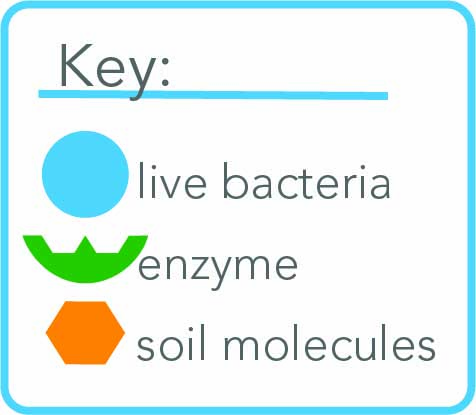
Probiotic Cleaning Solutions: An honest guide
 Emmeline | Product Specialist
Emmeline | Product Specialist
2 minute read
No one wants a 'clean' that cuts all the corners, but we're all intent on coming out on top by slashing the time it takes to clean and the number of times you need to clean to maintain a site's cleanliness. It's an obvious indicator of how effective and efficient you are as a company. It's this that's mostly spread by 'word-of-mouth' - maybe something your future clients will take more notice of than the hours you put in on your sales pitch.
If you're in the cleaning industry, you've probably heard of probiotic, prebiotic, synbiotic, biological and enzymic cleaners. You might already know how they work but hold back because the cost per litre is higher - 'Will my budgets cope with the change?' 'Are they as good as people make out?' 'What difference will switching make to our end-result?'
You've probably had similar questions and doubts going through you mind when you start considering new cleaning solutions. Afterall, what's the point of reinventing the wheel if your customers are happy with your service as it is?
This is an honest guide covering what Probiotic cleaning solutions are and how they work, how cost and time-effective, eco-friendly, sustainable, practical and easy to use they are.
What are Probiotic cleaners?
Probiotic (literally meaning 'for life') are living strains of bacteria that add to the population of good bacteria on surfaces to colonise and compete with the bad bacteria - in effect, taking over the area. Essentially, helping to reduce the existence of harmful bacteria on desks and other surfaces that could cause and/or spread illnesses.
Prebiotics are good sugars that act as food for the good bacteria (probiotics). This stimulates growth among the pre-existing good bacteria from the probiotics. Synbiotic cleaners have both probiotic and prebiotic natures - enabling a clean to be maintained even longer after the initial cleaning.
How Probiotic cleaners get areas completely dirt and odour free 

Once broken down, the bacteria can then consume the soil molecules and clean the surface or area that is brought into contact with the cleaner. This process repeats as the bacteria continue to produce enzymes, enabling the product to clean the microscopic grime and muck (often found in cracks, crevices, surface pores or grout), providing a deeper clean and longer-lasting odour control - for as long as 3 days later.
Do Probiotic cleaners actually work?
First let's bust the myth that milder, safer cleaners can't clean as well as powerful cleaning chemicals. It really isn't true - using milder cleaners doesn’t mean your sites won't be as clean. In 2016, a study that tested the use of probiotic cleaners in hospitals revealed that they reduce the development of drug-resistant bacteria, while another study in 2018 found that probiotic cleaners work in limiting the growth of dangerous bacteria.
So the days of killing 99.9 percent of bacteria, as traditional cleaners claim, may soon be a thing of the past. Afterall, you need some bacteria for the probiotics to work. The bacteria in probiotics are just very unlikely to cause harm to humans.
What Probiotics are great at |
What Probiotics aren't good at |
|||||
|
|
|
|||||
|
As the embedded dirt is removed, any bad odours that may have been around because of it are removed. This is the secret to why probiotic air freshening systems are the best deodourisers. |
||||||
|
Probiotics have also proven to be very effective for fogging - removing the dangers of germs and bad bacteria from surfaces and the air we breathe. |
How eco-friendly are Probiotics?
Probiotic cleaners are much better for the environment than chemical-based cleaners - which are produced using large-scale industrial processes that not only produce CO2 and are non-renewable, but also produce hazardous by-products that reside on surfaces after being cleaned.
Probiotic cleaners are formed of a collection of live bacteria which manufacturers grow/house for an extended period of time, until they can be made into super-effective cleaners. Because they have live bacteria that are always reproducing, probiotics are generally thought to be a sustainable option.
Are Probiotics practical and easy to use?
Honestly, you use them the same way you'd use regular cleaners. The only difference is with 'spray & wipe' cleaning. You spray and leave the probiotics to work for a few minutes. Then, the wiping is to spread the solution to cover more space so the good bacteria can work, not to get it off the surface completely.
A specified range of probiotic cleaning products ranging from your general multipurpose cleaners to food-safe cleaners, odour stoppers and gum removers. It's very straight-forward and easy to know where to use each product. But, don't forget to check the label or give us a call if you're unsure.
What do Probiotics cost? Are they cost-effective?
The cost per litre of probiotics is generally more expensive than the usual, standard ready-to-use cleaning chemicals. Because they can remain active for up to 3 days later and keep reproducing, getting to those minute areas you can't often get to, you'll find you don't need to use as much chemical every time you clean - and you won't need to keep maintaining the 'clean' as often.
Not only that, the cost in use of concentrated probiotics are even better because you can dilute them so much (some of them up to 1:300) that they go a long way.
So, although the initial cost per litre is higher, you'd be reducing the volume you need to buy and slashing your cleaning time because a higher standard is being maintained between cleans. You'd be ultimately saving more by spending more.




